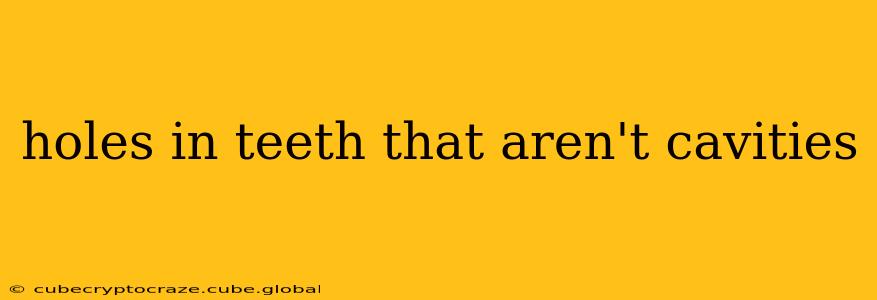Finding a hole in your tooth is naturally alarming. Most people immediately assume it's a cavity, but there are several other reasons why you might have a hole or pit in your tooth that isn't caused by tooth decay. Understanding these possibilities is crucial for getting the right treatment and preventing further problems. This article will explore the various reasons for holes in teeth other than cavities, offering clarity and peace of mind.
What are Cavities (Dental Caries)?
Before diving into alternatives, let's briefly define cavities. Cavities, or dental caries, are holes in your teeth caused by the acid produced by bacteria feeding on sugar and food particles left on your teeth. This acid eats away at the tooth enamel, creating a cavity. Cavities require dental intervention to prevent further damage and potential infection.
Holes in Teeth That Aren't Cavities: Common Causes
Here are several reasons why you might have a hole in your tooth that's not a cavity:
1. Erosion:
Tooth erosion is the gradual wearing away of tooth enamel. It's not caused by bacteria but rather by acidic substances. This can stem from:
- Acidic foods and drinks: Regular consumption of acidic beverages like soda, juice, and even some fruits can erode enamel over time, creating pits or holes.
- Gastroesophageal reflux disease (GERD): Stomach acid refluxing into the mouth can significantly erode tooth enamel, particularly on the back of the teeth.
- Bulimia or other eating disorders: Frequent vomiting exposes teeth to highly acidic stomach acid, leading to rapid enamel erosion and potential holes.
2. Abfraction:
Abfraction is the loss of tooth structure at the gum line due to repetitive forces and stress on the teeth. This usually appears as a V-shaped notch or small hole near the gum line. Factors contributing to abfraction include:
- Bruxism (teeth grinding): This common condition puts excessive pressure on the teeth, leading to chipping and wear.
- Clenching: Similar to bruxism, clenching your teeth puts stress on the enamel and can cause small fractures.
- Incorrect brushing techniques: Aggressive brushing can wear away enamel, especially near the gum line.
3. Attrition:
Attrition refers to the normal wear and tear of teeth over time due to chewing and grinding. While generally a slow process, years of consistent chewing can lead to slight depressions or flattening of the biting surfaces of the teeth. This isn't a hole in the typical sense but can appear as a significant change in the tooth's structure.
4. Enamel Hypoplasia:
Enamel hypoplasia is a developmental condition where the enamel doesn't form properly during tooth development. This can lead to pits, grooves, or discoloration on the surface of the teeth, which may appear as holes. Causes can include:
- Illness during tooth development: Severe illness in childhood can disrupt enamel formation.
- Nutritional deficiencies: Lack of essential nutrients during tooth development can impact enamel quality.
- Genetic factors: In some cases, enamel hypoplasia is hereditary.
5. Dental Trauma:
A direct blow or injury to the tooth can chip or fracture the enamel, resulting in a hole. This is common in contact sports or accidents.
How to Determine the Cause of a Hole in Your Tooth
Only a dentist can accurately diagnose the cause of a hole in your tooth. They will conduct a thorough examination, taking X-rays if necessary to assess the extent of any damage. They will then be able to determine whether it's a cavity, erosion, abfraction, attrition, hypoplasia, or trauma.
H2: What treatment options are available for non-cavity holes in teeth?
Treatment for non-cavity holes varies depending on the underlying cause and the severity of the damage. Options may include:
- Fluoride treatments: To strengthen weakened enamel and help prevent further erosion.
- Dental bonding: To fill in small chips or pits, improving the appearance and protecting the tooth.
- Dental crowns: For more extensive damage, a crown can protect and restore the tooth's structure.
- Night guards: To protect teeth from the effects of bruxism and clenching.
- Dietary changes: Reducing the consumption of acidic foods and drinks can help prevent further erosion.
H2: Can a hole in a tooth heal on its own?
Generally, holes in teeth do not heal on their own. Enamel is the hardest substance in the body, but it cannot repair itself once damaged. Therefore, professional intervention is often necessary to prevent further damage and potential complications. While some minor wear and tear might stabilize, significant holes require dental care.
H2: How can I prevent holes in my teeth?
Preventing holes in your teeth involves a combination of good oral hygiene and lifestyle choices:
- Brush twice daily with fluoride toothpaste: This helps remove food particles and strengthen enamel.
- Floss daily: To clean between teeth where your toothbrush can't reach.
- Limit consumption of sugary and acidic foods and drinks: This minimizes the production of acid that erodes enamel.
- See your dentist regularly: For checkups and professional cleanings.
- Consider a mouthguard: If you grind your teeth, a nightguard can protect your enamel.
By understanding the various reasons for holes in your teeth, you can better communicate with your dentist to receive the appropriate diagnosis and treatment. Remember, early intervention is key to preserving your oral health and preventing further complications.
